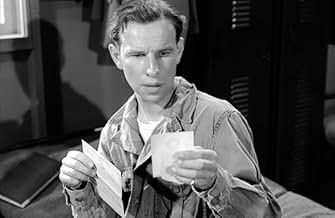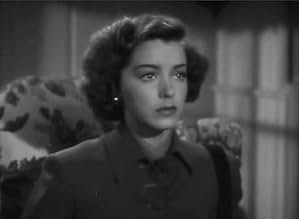Ajouter une intrigue dans votre langueAn oafish soldier receives a shirt but disregards the letter inside sent by a lovelorn secretary, prompting his bumbling friend to impersonate him in order to win her heart.An oafish soldier receives a shirt but disregards the letter inside sent by a lovelorn secretary, prompting his bumbling friend to impersonate him in order to win her heart.An oafish soldier receives a shirt but disregards the letter inside sent by a lovelorn secretary, prompting his bumbling friend to impersonate him in order to win her heart.
- Réalisation
- Scénario
- Casting principal
Ernie Adams
- Fireman
- (non crédité)
Fred Aldrich
- Uncle
- (non crédité)
Carmen Beretta
- Mother
- (non crédité)
Margaret Bert
- Undetermined Secondary Role
- (non crédité)
Barbara Billingsley
- Hospital Nurse
- (non crédité)
Avis à la une
This wartime rom-com starts with an employee of a shirt company putting a letter in the pocket of a uniform shirt supplied to the military in hopes that a soldier might find it and begin a romance with her.
That scheme might sound preposterous now, but eligible women in 1945 knew well that millions of dating-aged men had been out of circulation for four years due to the war. Imagine you had turned eighteen in 1941. In 1945, the end of hostilities could be just around the corner, but it was probably frustrating to have missed "normal" dating and courtship during your prime years for marriage. The idea of finding a man via the hidden letter probably seemed romantic.
In the film, Evie (Marsha Hunt) "pockets" the letter and when a soldier finds it, he pretends to be someone who better fits Evie's dreams. We call this catfishing today. John McPherson (Hume Cronyn) is the soldier who writes back. The story has elements of "Cyrano" and "The Shop Around the Corner", but it still has many original features. Eventually, the two correspondents have to meet and things go awry.
It's a well-written story and the leads are excellent in their roles. Kudos to director Jules Dassin, who uses a light touch.
The incidental music is very enjoyable. The score also includes the romantic song "All the Things You Are", which had been used in a few other films during the forties.
That scheme might sound preposterous now, but eligible women in 1945 knew well that millions of dating-aged men had been out of circulation for four years due to the war. Imagine you had turned eighteen in 1941. In 1945, the end of hostilities could be just around the corner, but it was probably frustrating to have missed "normal" dating and courtship during your prime years for marriage. The idea of finding a man via the hidden letter probably seemed romantic.
In the film, Evie (Marsha Hunt) "pockets" the letter and when a soldier finds it, he pretends to be someone who better fits Evie's dreams. We call this catfishing today. John McPherson (Hume Cronyn) is the soldier who writes back. The story has elements of "Cyrano" and "The Shop Around the Corner", but it still has many original features. Eventually, the two correspondents have to meet and things go awry.
It's a well-written story and the leads are excellent in their roles. Kudos to director Jules Dassin, who uses a light touch.
The incidental music is very enjoyable. The score also includes the romantic song "All the Things You Are", which had been used in a few other films during the forties.
This charming comedy caught me completely by surprise. Though the story borrows from "Cyrano de Bergerac," director Jules Dassin puts a modern comedic spin on it, and is ably assisted thanks to a knockout comedy performance by Hume Cronyn. In it, Cronyn plays a soldier who writes to a working girl Marsha Hunt, but sends her a photo of his handsome Lothario buddy (John Carroll). Hunt is lovely as Evie, and it's easy to see why Cronyn would fall for her. The movie also didn't end exactly as I expected, which was another pleasant surprise. TCM seems to be the only place to find this movie, so eye its schedule for an upcoming showing. Definitely worth seeking it, especially for Cronyn, who is brilliant in this film.
The plot is like a million others before and since, but it doesn't feel like it somehow. Perhaps it's because Marsha Hunt and Hume Cronyn are both so charming (I've never seen the often villain-ized Cronyn play a role like this before). The rest of the actors do a good job too, with John Carroll particularly well-cast. It's amusing and somewhat touching without being sappy. I wish it wasn't so seldom shown.
Why wasn't Marsha Hunt a bigger star? What a sweetie! And what a smile! Really well written take on the mistaken identity romantic comedy. The scene with the great Spring Byington where Johnny's identity was finally revealed went from laugh out loud funny to sad and touching. And the scene with Evie on the bed weeping her confusion when she finally learns the truth was equally well done: both by script writer and Marsha Hunt. Hume Cronyn was perfect. Who would have thought the actor so often cast as a weaselly villain could be such a romantic hero? I loved the last scene where Johnny heroically tries to "Tell her what she wants to hear" ends at last with the romantic resolution. By the way, that scene at the rest home with the friend of the dead soldier added a bit of depth not usually expected in such a generally frothy romance. Another example of how well this was written and played.
Marsha Hunt (Evie) works for a company that makes shirts for soldiers. After witnessing a fellow worker finding true love after slipping a note into a shirt consignment and communicating with an unknown man in uniform - he turns up at the office one day and they walk off together for a life of romance - she tries the same trick. She picks a shirt size - size 16 1/2 collar, writes a note, slips it into the pocket and waits to see what happens. John Carroll (Wolf) gets the shirt but isn't interested and throws the note away. However, his buddy Hume Cronyn (Johnny), who is a lot smaller than Carroll, retrieves the letter and starts to correspond with Hunt. What will happen when Cronyn comes face to face with Hunt, after all, he is not what she is expecting. Cronyn decides to pretend to be someone else and so begins a series of misunderstandings.
The film moves along nicely and the cast are good, particularly Hunt and Cronyn. Occasionally, Carroll mangles his words but you can still make out what he is saying. It's a heart-warming romance peppered with light humour and it succeeds as we find ourselves rooting for the small guy.
The film moves along nicely and the cast are good, particularly Hunt and Cronyn. Occasionally, Carroll mangles his words but you can still make out what he is saying. It's a heart-warming romance peppered with light humour and it succeeds as we find ourselves rooting for the small guy.
Le saviez-vous
- AnecdotesNorman Lloyd (DeWitt Pynchon) and Marsha Hunt (Evie O'Connor) both became centenarians. Lloyd celebrated his 100th birthday on November 8, 2014 while Hunt celebrated hers on October 17, 2017.
- GaffesWhen Evie says The Three Musketeers is a favorite of hers, John agrees and lists the three as "Athos, Porthos and d'Artagnan". Actually, in the novel the original three musketeers are Athos, Porthos and Aramis. D'Artagnan is the rookie (fourth) musketeer who joins their coterie.
- ConnexionsFeatured in Marsha Hunt's Sweet Adversity (2015)
Meilleurs choix
Connectez-vous pour évaluer et suivre la liste de favoris afin de recevoir des recommandations personnalisées
Détails
- Durée1 heure 29 minutes
- Couleur
- Rapport de forme
- 1.37 : 1
Contribuer à cette page
Suggérer une modification ou ajouter du contenu manquant

Lacune principale
By what name was Une lettre pour Evie (1946) officially released in India in English?
Répondre






























